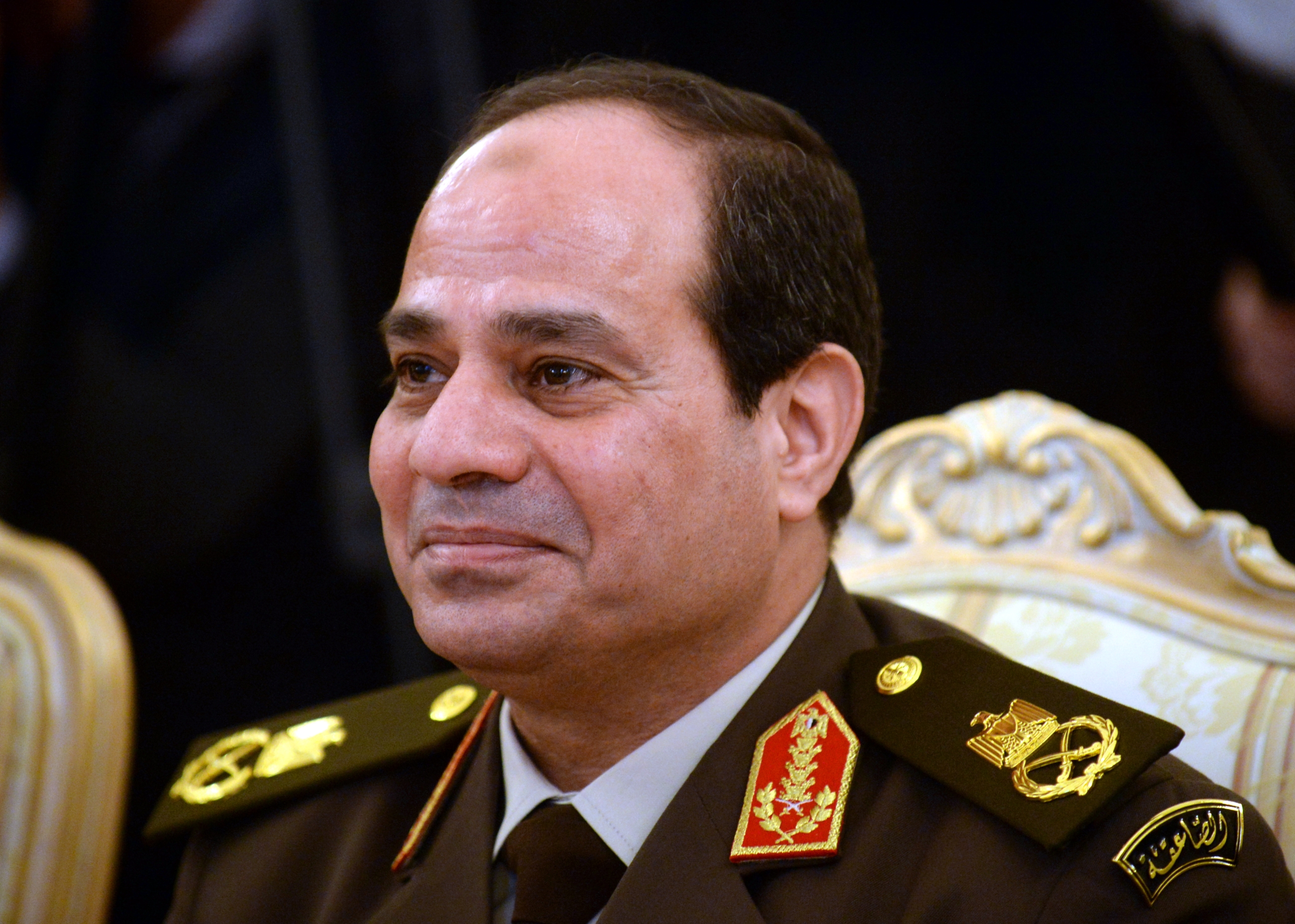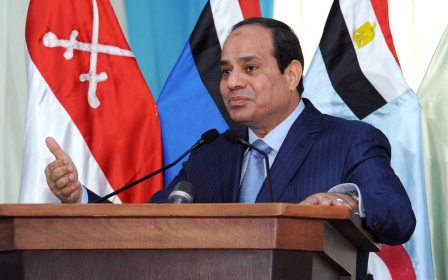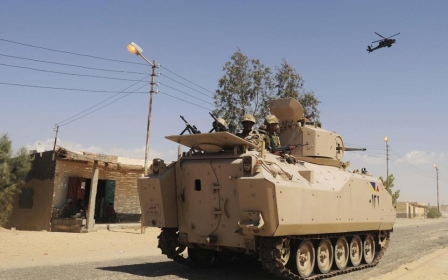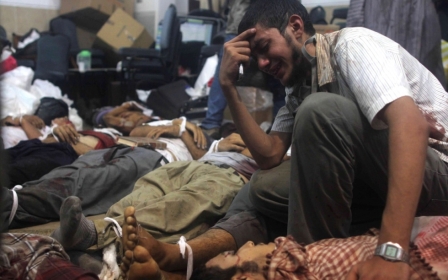Egypt: Land of the Generals

Since the ouster of former Muslim Brotherhood President, Mohamed Morsi by Egypt's Supreme Council of the Armed Forces (SCAF) last year, the country's highest ranking military officer Field Marshal, Abdel Fattah el-Sisi has been the most powerful man in the country, and formally took the office of president in June.
In the aftermath of the military takeover, the presence of senior military figures in other influential political positions has expanded beyond the office of president. In one recent example on 18 October, General Khaled Abdel-Sallam al-Sadr was appointed secretary-general of Egypt's parliament, the House of Representatives. Sadr is the first military officer in Egypt's history to serve in the role.
The wide spread of political influence that the military has enjoyed, is perhaps, clearest in Egypt's regional political system. In total, 19 out of 27, or 70 percent, of the country's provinces are now led by a man with the rank of “liwa” (major-general), although in two cases, the governor is a police rather than military general.
The list of governor generals - who exercise considerable authority over the cities, towns, and villages within their provinces - includes at least two former senior military intelligence officers, and the former military attache to the Egyptian embassy in London, General Tarek Saad Eddin, who is provincial governor of Luxor.
The majority of these appointments were made last August when all 11 of former President Morsi's Brotherhood provincial governor appointees were sacked and replaced with generals, news of which was widely promulgated.
Less well known, however, is that in every one of the eight provinces in which the governor is not a general (Cairo, Giza, Beni Suef, Kafr el-Sheikh, Qalyubiya, Fayoum, Sharqiya, and Menoufia) a high-ranking general serves as either deputy-governor or secretary-general for the province.
For example, the office of the governor of Cairo is held by a civilian, Dr. Galal Saeed, however he is assisted by three deputy-governors, General Ayman Abdel Tawab, General Ahmed Saqr, and General Yasseen Hossam Eddin, who all hold the rank of major-general. Abdel Tawab is a former special forces commander.
In the province of Giza, the governor is also a civilian, Dr. Ali Abdel Rahman Yousef. However, Yousef is assisted by Deputy-Governor General Ala al-Haras and Deputy-Governor General Osama Shamaa, as well as General Mohammed al-Sheikh, the secretary-general of Giza province.
In the majority of Egypt's provinces, there are two or more generals holding senior governing positions. In the case of five of the most important provinces, Cairo, Alexandria, Giza, Ismailia, and Sharqiya, there are three major-generals who currently hold senior office.
In all, there are at least 24 deputy-governors, secretary-generals, and assistant secretary-generals with the rank of major-general in addition to the 19 provincial governors.
According to professor Yezid Sayigh, a senior associate at the Carnegie Middle East Centre who has done extensive research on the influence of Egypt's generals, looking only at senior appointments may be misleading as the scale of the trend suggests that at lower ranks, and in positions of less importance, there may be even more military officers in less prominent positions.
“The military has certainly had a major presence in the state for some time, in fact the trend of military appointments was first established 25 years ago, and has been expanding,” Sayigh said, noting that under Mubarak military men were commonly appointed to governorships.
“Appointments were treated as a sort of loyalty reward; the military was loyal to the state and was rewarded for that with jobs and wealth,” he told Middle East Eye.
Sayigh said there's no real evidence to suggest that military officers have been more productive or more efficient in these posts.
“In fact, what seems to have happened is that officers have formed a new privileged social class, which is a major social change - not that management has become more efficient,” he said.
“In the past there have been other countries in which the reach of the military is very large, in Latin America for instance, or in Pakistan today,” said Sayigh, “but I'm not sure there's any other country where the presence of military officers at all levels of the state is as extensive as in Egypt.”
The influence of the generals is certainly not limited to local government. Egypt's cabinet also employs four officers at the ministerial level with the rank of major-general or higher.
Defence Minister, Lieutenant-General Sedqy Sobhy and Minister for Military Production General Ibrahim Younes are both senior armed forces officers, as are the two assistant minsters for defence: General Mamdouh Shahin and General Mohamed al-Assar, both of whom formerly served as aides to Hosni Mubarak's long serving defence minister (and head of state following Mubarak's resignation) Mohamed Hussein Tantawi.
While these are positions in which military affairs are paramount, that is not so for the secretary-general of the cabinet, who heads administration for all the ministers. The current occupant is another major-general, Amr Abdel Moneim.
“The military has had this kind of dominant role in the Egyptian state apparatus since the 1952 coup that ended the monarchy,” said Joel Beinin, professor of Middle East history at Stanford University.
“The military certainly does now play an out-sized role in the Egyptian state apparatus. I don't know if this is the largest role of the military in any state, but perhaps if you think of personnel it is,” professor Beinin said, noting that personnel alone is not the only factor that determines military influence, and that in other Middle Eastern states, including Israel, the military also has great power.
However, in addition to the more hybrid military-political positions that Egypt's generals hold, they also occupy a range of, sometimes obscure, civilian state posts. The chairman of Egypt's national statistics body CAPMAS is a military officer, General Abu Bakr al-Gendy, and the Egyptian Authority for Maritime Safety is led by General Tareq Ghanem who holds the Navy equivalent to the Major-General rank, “liwa bahry.”
The chairmen of all four of Egypt's major port authorities are also generals. The chairman of the Port Said authority is the navy's General Medhat Moustafa, and in Damietta General Sami Suleiman Mahmoud holds the office. The Alexandria Port Authority chairman is General Abdelkader Darwish, and the chairman of the Red Sea Ports Authority, Hesham Abo Senna, is another general.
The chairman of Egypt's Suez Canal Authority is SCAF member, and former Commander-in-Chief of the Navy, Mohab Mamish, who holds a higher rank equivalent to colonel-general. Mamish also sits on the board of directors for the Suez Canal Bank.
At the Administrative Control Authority, a powerful, nominally independent regulatory body responsible for investigating corruption, both Chairman Mohammed Omar Wahby and Deputy-Chairman, Hossam Rashwan are retired generals.
Although many of these military officers held their positions before the military takeover following Morsi's ouster last year, and some before the January 2011 uprisings, the sheer extent of generals occupying civilian office is difficult to overstate.
Egypt's general authority for roads, bridges, and land transport, for example, is headed by a military officer, Major-General Saad al-Goyoushi. The chairman of the central agency for reconstruction, an official body that oversees planning and building work, is Major-General, Mohammed Nasser.
And it is not only state agencies but also state-run and state-owned companies where, often retired generals become senior officials and even managers. The current head of the state run Egyptian airports company is General Adel Abdel Aziz Mahgoub and General Ahmed Abdul Hameed Qamhawy, the chief of staff of the military's signal corps, is a director at state-owned Telecom Egypt.
“It's clear that since Sisi ousted Morsi, there has been an expansion of military control even beyond the high level there has been historically,” said Ahmed Morsy, a research associate in the democracy and rule of law program at the Carnegie Endowment for International Peace, who specialises in Egypt.
“From nationalistic rhetoric put forward by supporters of the military order, to the attacks on dissent, to the style of governing at the top, to appointments, the military's influence is clearer and more vivid than ever,” he told MEE.
New MEE newsletter: Jerusalem Dispatch
Sign up to get the latest insights and analysis on Israel-Palestine, alongside Turkey Unpacked and other MEE newsletters
Middle East Eye delivers independent and unrivalled coverage and analysis of the Middle East, North Africa and beyond. To learn more about republishing this content and the associated fees, please fill out this form. More about MEE can be found here.




